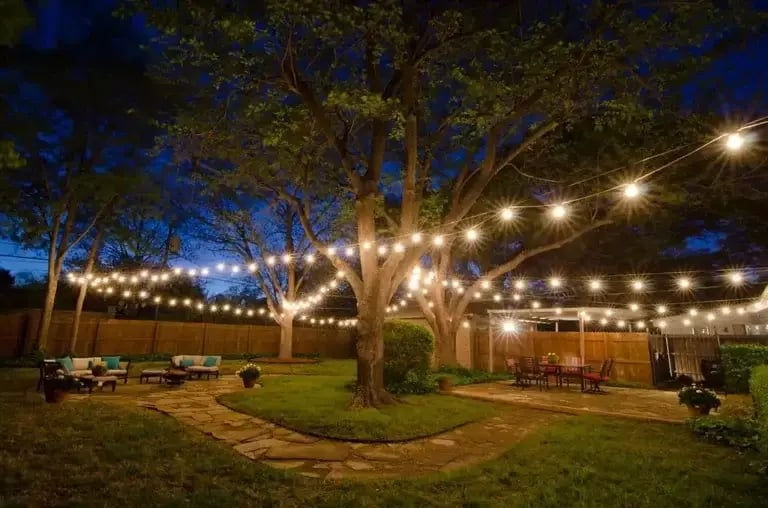Solar vs Wired Outdoor Lighting: How to Choose the Right One for You?
July 8th, 2025
4 min read

“It’s just too dark outside at night.”
That’s the thought that keeps coming back. Whether you’re walking the dog, hosting friends on the patio, or simply trying to unlock the front door after sunset. You want better lighting, but you’re not sure what’s worth the money. Should you grab a few solar lights from the hardware store… or invest in something more permanent?
At Integra Electrical, we’ve installed thousands of outdoor lighting systems over the last 20+ years. We know how much the right lighting can transform how your home looks, feels, and functions, especially on those late summer nights when you’re still outside long after the sun has gone down. And while we specialize in wired lighting, we’re here to help you decide what’s best for your home, because honestly, depending on your situation, either solar or wired lighting might be the better choice.
Here’s what we’ll cover:
- The difference between wired and solar lighting
- The installation and operating costs of each
- The brightness and reliability you can expect
- Safety, aesthetics, and how both options feel to live with
- What's the best fit for you
By the end, you’ll know which option is the right fit for your home and how to take the next step with confidence.
Solar vs Wired: What's the Real Difference?
Solar lighting is a method of outdoor lighting that uses sunlight to generate electricity, which then powers small LED lights. Most solar lights are self-contained, plug-and-play, and turn on automatically at dusk.
Wired lighting, on the other hand, is powered directly by your home’s electrical system. These lights are hardwired into your home, typically installed by a licensed electrician, and can be controlled by switches, timers, or smart devices.
Each has its place, but how do you know which one is right for you? Let’s break it down.
Installation & Operating Costs of Solar and Wired Lighting
When it comes to cost, solar and wired lighting offer two very different paths.
Solar Lighting
Solar lighting is typically the cheaper option up front. Most solar lights are DIY-friendly, require no wiring, and can be installed in minutes. You won’t need to hire an electrician, pull a permit, or touch your home’s electrical system. They will need occasional cleaning or battery replacement. That said, solar lights may need to be replaced more often due to their shorter lifespan, especially in a place like Iowa, where it’s bright and sunny one day and storming (or snowing) the next.
Wired Lighting
Wired lighting, on the other hand, has a higher upfront cost. It usually requires professional installation, especially if new wiring or trenching is involved. Permits may be needed depending on your city. But while the initial investment is greater, wired systems tend to last longer and deliver better performance over time.
When you're thinking about total cost, it helps to look beyond installation. Solar lights may need to be replaced more frequently due to weather wear, battery failure, or dimming over time. Wired lighting, if installed properly, can last for decades with little upkeep.
If you're looking for a quick, budget-friendly solution, solar might be a great fit. But if you’re aiming for long-term value, wired lighting is more likely to deliver a better return.
Brightness & Reliability
Not all outdoor lighting performs the same, especially when the sun goes down.
Solar Lighting
Solar lighting tends to be dimmer than wired lighting and depends heavily on weather and sunlight exposure. If your lights are shaded during the day or it’s been overcast for a few days, you might notice them fading early, or not turning on at all. In winter months or on cloudy stretches, performance can drop even further. For that reason, solar lights aren’t ideal if you need consistent brightness or are relying on them for safety or security.
Wired Lighting
Wired lighting offers dependable performance every time you flip a switch. Because it’s powered by your home’s electrical system, it won’t fade, dim, or shut off unless the power goes out. You can set timers, add motion sensors, or even control your lighting through a smart home system. For walkways, entryways, and outdoor living spaces, the consistency of wired lighting makes a big difference, especially when safety is a priority.
Safety, Aesthetics & Functionality
When you’re choosing outdoor lighting, it’s not just about what works, it’s about how it feels to live with it every day.
Solar Lighting
Solar lights are designed for simplicity. You place them where they’ll get sunlight, and they turn on automatically at dusk. That can work well for casual lighting along a garden path or fence line. But when it comes to safety, they can fall short, especially after a few cloudy days or during Iowa’s long winters.
From an aesthetic standpoint, solar fixtures tend to be basic. Most are made of lightweight materials with limited design options. They’re great for a quick solution, but they may not offer the clean, finished look many homeowners are after.
As for functionality, solar lights work independently of your home’s electrical system. That makes them easy to install, but also means you have less control. Most can’t be dimmed, scheduled, or integrated into a smart home setup.
Wired Lighting
Wired lights are more dependable when it comes to safety. They turn on when you need them, rain, shine, or snow, and can be connected to motion sensors, timers, or switches so your walkways, porches, and entry points are always well-lit.
With aesthetics, wired lighting gives you more freedom to match your home’s style. Fixtures can be recessed, decorative, or custom-designed to highlight architecture, landscaping, or outdoor entertaining areas. The result feels intentional and professional.
In terms of functionality, wired systems can integrate with your smart home, outdoor audio, cameras, and other systems. You can control them remotely, adjust brightness, and customize how and when they operate, making them ideal for homeowners who want full control.
What's the Best Fit for Your Home?
Both solar and wired lighting have their place, it just depends on what you need your lighting to do.
Solar Lighting might be the right choice if you:
- Need a quick, budget-friendly solution
- Want to light a small area like a garden path or shed
- Are renting, moving soon, or not ready to invest long-term
- Don’t mind replacing fixtures every few years.
Wired Lighting is likely a better fit if you:
- Want reliable lighting every night, in any weather
- Are concerned about safety, security, or curb appeal
- Prefer a clean, custom look that complements your home.
- Plan to live in your home for a while and want long-term value.
- Want control through switches, timers, or smart home tech
If you’re still unsure, that’s okay. Thinking through how you use your outdoor space, especially during late summer nights when you’re entertaining or simply enjoying your home, can help point you in the right direction.

Your Next Step: Let’s Talk Lighting Options
If you’re still weighing the pros and cons, don’t worry. Choosing the right outdoor lighting is about more than just bulbs and fixtures; it’s about how you want your home to feel when the sun goes down.
At Integra Electrical, we’re here to help you explore what’s possible. Whether you already have a vision or aren’t sure where to start, we offer no-pressure consultations to walk through your goals and give expert recommendations tailored to your home.
Schedule your outdoor lighting consultation.
Abigail Carpenter is the Content Manager at Integra Electrical and the wife of a licensed electrician. As a homeowner and seasoned writer, she helps make sense of the technical stuff so you can feel confident about the place you call home.
Topics:





